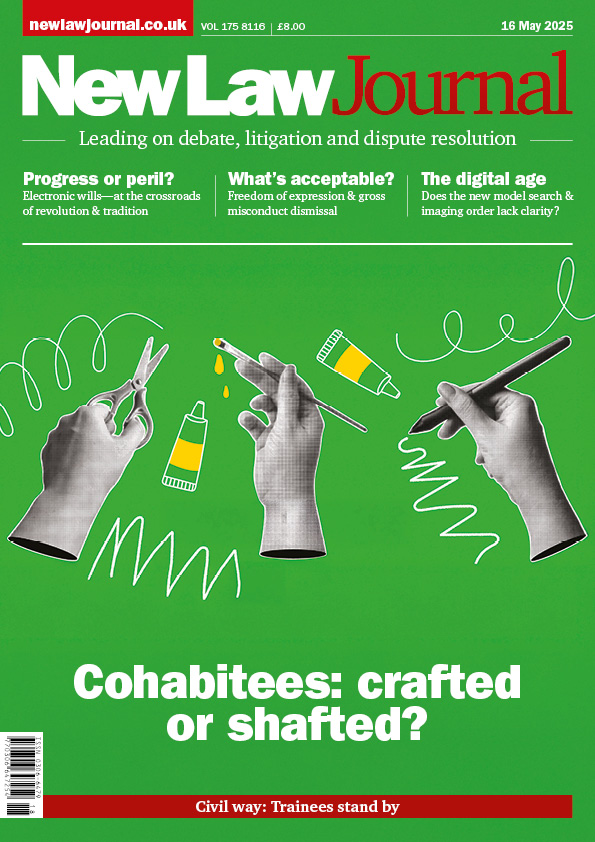THIS ISSUE

Law reform to give more rights to cohabiting couples has been on the campaign agenda for a long time, but is a blanket approach best? In this week’s NLJ, Caroline Bowden, consultant at Anthony Gold, looks at the difference between couples who have chosen not to legally regulate their relationship, and those where one partner has economic power and the other does not.
We need robust new legislation to tackle the online advertising of prostitution, writes Lesley Manley
Most documentary evidence is in digital format, mainly stored in cloud-based platforms, but is the new model search and imaging order, which came into force in April, fit for purpose? In this week’s NLJ, Mary Young, partner, Kingsley Napley, considers this question in depth.
A waste of time or due process? Neil Parpworth reports on the Lords debating the Lords
Caroline Bowden sets out the need for cohabitation reform—for some couples but not others
The new model search & imaging order lacks the clarity needed for the digital age, argues Mary Young
Whistleblowing protection is inching forward with judicial help, writes Charles Pigott—but reform is still needed
Could we soon be tapping out wills on our phones, ask Brendan Udokoro & Kiera Quinn
Electronic wills—inevitable in a digital era, or an abomination liable to wreak fraudulent chaos? In this week’s NLJ, Brendan Udokoro, associate, and Kiera Quinn, associate (New Zealand qualified), Howard Kennedy, examine the pros and cons, risks and rewards of allowing people to tap out their will on their phone or laptop.
MOVERS & SHAKERS

Freeths—Ruth Clare
National real estate team bolstered by partner hire in Manchester

Farrer & Co—Claire Gordon
Partner appointed head of family team

mfg Solicitors—Neil Harrison
Firm strengthens agriculture and rural affairs team with partner return
NEWS
Conveyancing lawyers have enjoyed a rapid win after campaigning against UK Finance’s decision to charge for access to the Mortgage Lenders’ Handbook
The Crown Prosecution Service (CPS) has launched a recruitment drive for talented early career and more senior barristers and solicitors
Regulators differed in the clarity and consistency of their post-Mazur advice and guidance, according to an interim report by the Legal Services Board (LSB)
The Solicitors Act 1974 may still underpin legal regulation, but its age is increasingly showing. Writing in NLJ this week, Victoria Morrison-Hughes of the Association of Costs Lawyers argues that the Act is ‘out of step with modern consumer law’ and actively deters fairness
A Competition Appeal Tribunal (CAT) ruling has reopened debate on the availability of ‘user damages’ in competition claims. Writing in NLJ this week, Edward Nyman of Hausfeld explains how the CAT allowed Dr Liza Lovdahl Gormsen’s alternative damages case against Meta to proceed, rejecting arguments that such damages are barred in competition law







